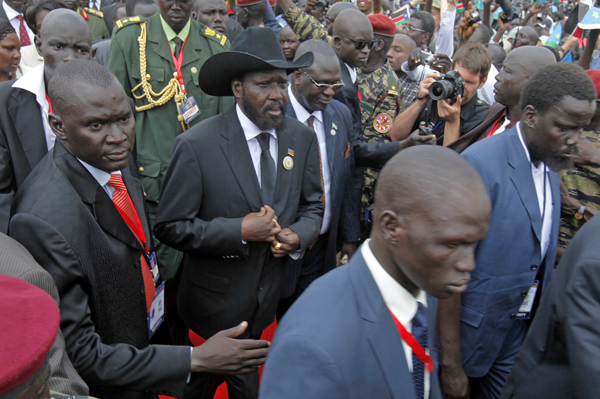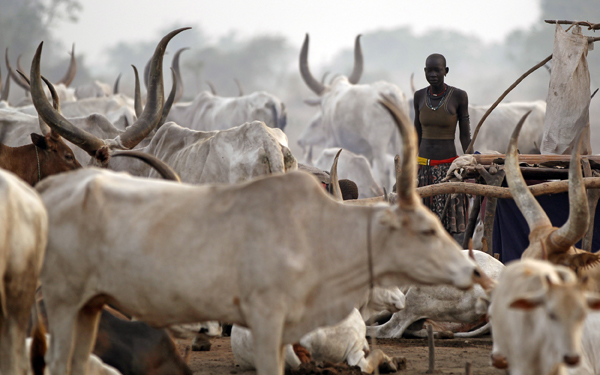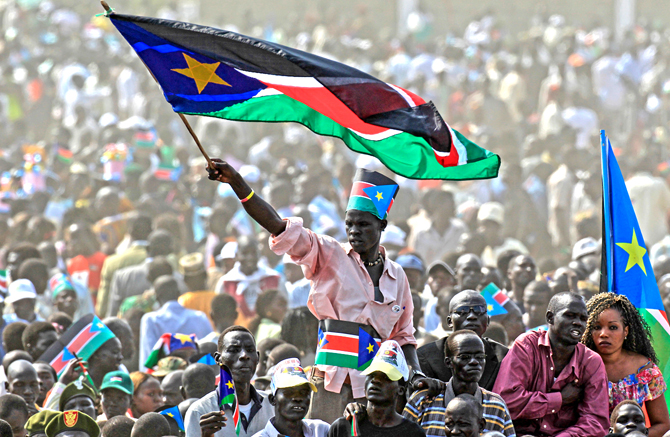Africa’s newest nation, South Sudan, officially celebrated its independence in its capital of Juba on 9 July. South Sudan is now the 193rd nation on the planet – and virtually no other country has even less infrastructure or fewer kilometres of tarred road. By J BROOKS SPECTOR.
South Sudan received almost immediate diplomatic recognition from the US and UK. President Barack Obama’s statement read: “A proud flag flies over Juba and the map of the world has been redrawn. These symbols speak to the blood that has been spilled, the tears that have been shed, the ballots that have been cast and the hopes that have been realised by so many millions of people.”
Salva Kiir, wearing his trademark black cowboy hat (the very same one given him by George W Bush), hosted the joyous midday ceremony. In his remarks, Kiir told the throngs: “We have waited for more than 56 years for this. It is a dream that has come true. This land has seen untold suffering and death. We have been bombed, enslaved and treated worse than refugees in our own country. We have to forgive, though we will not forget.”
Even Sudan’s President Omar al-Bashir, attended the event. Since seizing power in 1989, al-Bashir had carried on efforts to suppress the revolt, continuing those of the previous government, trying to stamp out the southerners’ five decades of insurgency. Then, in 2005, al-Bashir agreed to a ceasefire that eventually led to the referendum and finally independence for the southern third of his own nation.
At the actual Independence Day celebration, organisers quickly learnt they had prepared far too few seats to accommodate all the attending dignitaries, visiting heads of state and chief panjandrums. Included in the A list were South Africa’s Jacob Zuma, Zimbabwe’s Robert Mugabe, Ethiopia’s Meles Zenawi, Equatorial Guinea’s Teodoro Obiang (also chairman of the African Union), Kenya’s Mwai Kibaki and Uganda’s Yoweri Museveni, in addition to UN Secretary General Ban Ki-moon.
During the ceremonies, many people fainted in the sweltering midday heat. International Red Cross staffers worked to deal with those overcome by the oppressive temperatures. The New York Times correspondent in Juba, describing the celebrations, had written of the event that, “Many of those who turned out to celebrate, overcome with emotion, spoke of their fathers, mothers, sons and daughters killed in the long struggle to break free from the Arab-dominated north. ‘My whole body feels happy,’ said George Garang, an English teacher who lost his father, grandfather and 11 brothers in the war.”

Photo: South Sudan’s President Salva Kiir (C) walks during the Independence Day ceremony in Juba July 9, 2011. Tens of thousands of South Sudanese danced and cheered as their new country formally declared its independence on Saturday, a hard-won separation from the north that also plunged the fractured region into a new period of uncertainty. REUTERS/Goran Tomasevic.
By sunrise, the crowds were surging through the streets of Juba, to the government quarter, where the declaration of independence would be read aloud. Thousands of soldiers lined the freshly painted curbs, tiger patches on their arms, assault rifles in their hands. This new nation is being built on a guerrilla army, the Sudan People’s Liberation Army, whose field commanders are now South Sudan’s political leaders, and the amount of firepower was unnerving.
Despite traditional dancers and drummers performing in the streets, not everyone was overcome by the happiness and euphoria of the moment. Some activists who came from the western Sudan region of Darfur, an area that has similarly suffered major violence over the past decades at the hands of Sudanese military forces or militia forces, came to the party eager to convey a very different message. Their signs read “Bashir is wanted dead or alive” – a reference to the fact that Al-Bashir has already been indicted by the International Criminal Court for war crimes in Darfur.
In his speech at the ceremonies, Ban Ki-moon tried to urge the two sides to “let their differences be resolved around the negotiating table” pointing to the obvious fact that Sudan and South Sudan have yet to resolve some of their major differences. Most notably, the still-to-be-defined border in the Abyei region has seen a tense military standoff and in South Kordofan, now included in the northern nation of Sudan, still has many southern supporters living there and the region has been the scene of military clashes between the two sides in the past several weeks. In fact, at this point, the two nations’ 2,100km remains in dispute in five distinct areas, and troops from the two sides have taken positions beyond the defined border on either side of it.
US ambassador to the UN Susan Rice, the American envoy to the event, offered a dose of tough love, saying, “Independence was not a gift you were given. Independence is a prize you have won. No true friend would offer false comfort. The path ahead will be steep, but the Republic of South Sudan is being born amid great hopes.”
Taban lo Liyong, a South Sudanese writer and literature professor at the University of Juba, commenting on the realities of independence, told the Los Angeles Times’ that now that the country was independent his countrymen could no longer blame the north for the south’s woes. “From today on, the blame game is off. Nobody can use the Arabs as a bogeyman.”
No question about all those challenges. The Independence Day bash was the easy part. Aside from incomplete agreements with Sudan over the division of oil revenues, the management of the export of the oil that must flow through Sudanese territory to export terminals, the unresolved disputes over some portions of the border and population transfers, the ongoing revolts by various insurgent bands battling the new government and the near total need for any kind of public works that can be identified and listed, the country also has ongoing disputes over the reach and role of government and civil rights.
In fact, the new national government also confronts extraordinary challenges of shrink-wrapping a large, frequently predatory army, somehow diversifying an economy that relies on oil for virtually its revenue and sorting out how civilian power will rationally be divided among dozens of ethnic and military factions. Oh, and while all that is going on, it must also make a start in meeting such elemental needs as delivering education, health services, water and electricity to more than 8 million citizens. (South Sudan claims the population is at least 3 million more than the usual internationally accepted figure.)

Photo: A woman from the cattle herding Mundari tribe walks early morning in a settlement near Terekeka, Central Equatoria state, south Sudan January 19, 2011. REUTERS/Goran Tomasevic
The new state, however, has abundant natural resources. Not least is that it contains around 75% of the old unified Sudan’s daily petroleum production of 490,000 barrels, as well as plentiful water from the Nile and other waterways, rich soils and large areas of grazing land and, of course, the cattle that graze on them. In an effort to get something going economically and in support of the peace accord, the southern government recently called on the US to end its economic sanctions of Sudan, a prohibition that prevents American companies from investing in Sudan.
Exploitable copper, gold and tin reserves may well be important for the new country’s economy as well, but these could also ignite problems with the North over their effective exploitation and export. Observers note that the combination of natural resource abundance and weak government has rarely produced felicitous outcomes on the continent. The new South Sudanese government also has a paucity of trained officials, there is little in the way of computerisation in the government and The Economist has even noted that most of the country’s tax collectors are still illiterate.
Moreover, while large expanses of rich, fertile farmland in the South are appropriate for large-scale commercial agriculture, domestic and international NGO groups are already warning of the chances of foreign investors carrying out “land grabs”, in part because of a lack of appropriate regulation by the new government on land use and foreign economic involvement in the country. Still another challenge for this new nation will be sorting out how to monetise the country’s livestock by moving the cattle-holding Dinka and Nuer people away from “cow worship”, as The Economist gently terms their relationship with their herds. The new government says the country has 12 million head of cattle and 24 million goats and sheep, but by the same token there is no meat-export industry and there appears to be little interest among herders in selling their animals for commercial exploitation.
But making a dent in any of the challenges facing the new country will need the mother of all service-delivery efforts. And to say this is probably underestimating the country’s real problems. On the other hand, aid workers will probably find plenty of permanent employment dealing with the challenges of the South Sudanese economy and society. For example, an AP report, summarising some of the challenges, noted that South Sudan is: “One of the least-developed regions in the world, where an estimated 85% of the population is illiterate. The UN says a 15-year-old girl in Southern Sudan has a higher chance of dying in childbirth than finishing school. There was only a mile or two of pavement in its capital just a little over a year ago. Food prices have soared in recent months and unemployment is high: Many southerners are self-sustaining cattle-keepers or farmers, while others subsist off small sales of tea and other goods.”
South Sudan’s population is significantly different from its new northern –primarily Arabic and Islamic– neighbour. In the South, animist and Christian religious practices predominate (although there are Muslims in the population as well) and most of the people in that area are darker Nilotic peoples – and often really, really tall and the subject of some extraordinary photographic essays as well.
The half-century of civil strife claimed an estimated 2 million victims and forced perhaps twice that many southerners to flee their homes as domestic refugees.
Watch: In South Sudan, a Nation Is Born – But With Troubles (PBS)
American Christian groups have had connections to the region for more than 100 years. When George W Bush became president, partly in response to Christian lobbying, he pushed Sudan up near the top of his foreign policy agenda and the US helped push the two sides to sign a comprehensive peace agreement that guaranteed the southerners the right to secede.
For hundreds of years before that, the southern region had been subjected to raids from the north for slaves, and the region – then called Equatoria – became a hotly contested zone in the “Scramble for Africa” as the expansionist goal of Arab Egypt (and its British overlords) and between French, British and Belgians.
Fashoda, now renamed Kodok in the northern part of South Sudan, was the high watermark of the 19th century European competition to claim broad swathes of African territory.
For Daily Maverick readers interested in catching up with South Sudan’s new national symbols, the new currency, the South Sudan pound will feature the image of the late John Garang, the country’s most honoured leader. Garang was the founder of the Sudanese People’s Liberation Army and its political wing, the Sudanese People’s Liberation Movement. He perished in a helicopter crash in 2005 after the peace deal was signed. The country’s flag actually looks a lot like the old one, with the addition of a star.
And for those looking for a real challenge in a boring, humdrum existence, The Carter Center in Atlanta, Georgia, is seeking to staff up an office in Juba. They have just issued a call for applications to serve as Director of their Democracy Programs in the new nation. The successful candidate “would manage the Center’s observation of the political transitional and constitutional development in South Sudan.” According to the Carter Center’s announcement on the Internet: “Applicants should have 7-10 years of senior level experience working on or analyzing constitutional development or political reform programs, ideally in countries transitioning from war to sustainable peace. Knowledge of program design and proposal development is highly desirable.
“The position requires relocation to South Sudan by early August, and will involve frequent internal travel within the country. Knowledge of Arabic or other South Sudanese languages is desirable but not required.
“Leadership skills, personnel management experience and cross-cultural understanding required. Demonstrated ability to provide advice and guidance regarding democratic governance and conflict prevention is strongly encouraged. Salary is commensurate with experience.
“Operators are standing by. Call 00-1-678-522-6972.” No joke, this is the real deal. DM
For more, read:
- South Sudan Celebrates its Birthday on Yahoo news;
- A look at the history, people of South Sudan at AP;
- After Years of Struggle, South Sudan Becomes a New Nation at The New York Times;
- Sudan: Recent Developments at The New York Times;
- Independent South Sudan is jubilant, wobbly a day later at the Los Angeles Times;
- South Sudan’s new national anthem;
- Standing by South Sudan by UN Secretary General Ban Ki-Moon in The New York Times;
- South Sudan pound to be launched next week at the BBC;
- Sudan’s separation – Their day in the sun at The Economist;
- Independence for South Sudan, Uncertainty for Those Displaced from the South a study by the Brookings Institution;
- South Sudan’s Challenge to Africa’s Colonial Borders, a study by the Council on Foreign Relations;
- The Government of South Sudan’s official website;
- Job Solicitation by the Carter Center at the Foreign Policy Association website;
- In South Sudan, can liberators build a nation? a column in The Washington Post by former Bush aide, Michael Gerson.
Main photo: A man waves South Sudan’s national flag as he attends the Independence Day celebrations in the capital Juba, July 9, 2011. Tens of thousands of South Sudanese danced and cheered as their new country formally declared its independence on Saturday, a hard-won separation from the north that also plunged the fractured region into a new period of uncertainty. REUTERS/Thomas Mukoya


















 Become an Insider
Become an Insider